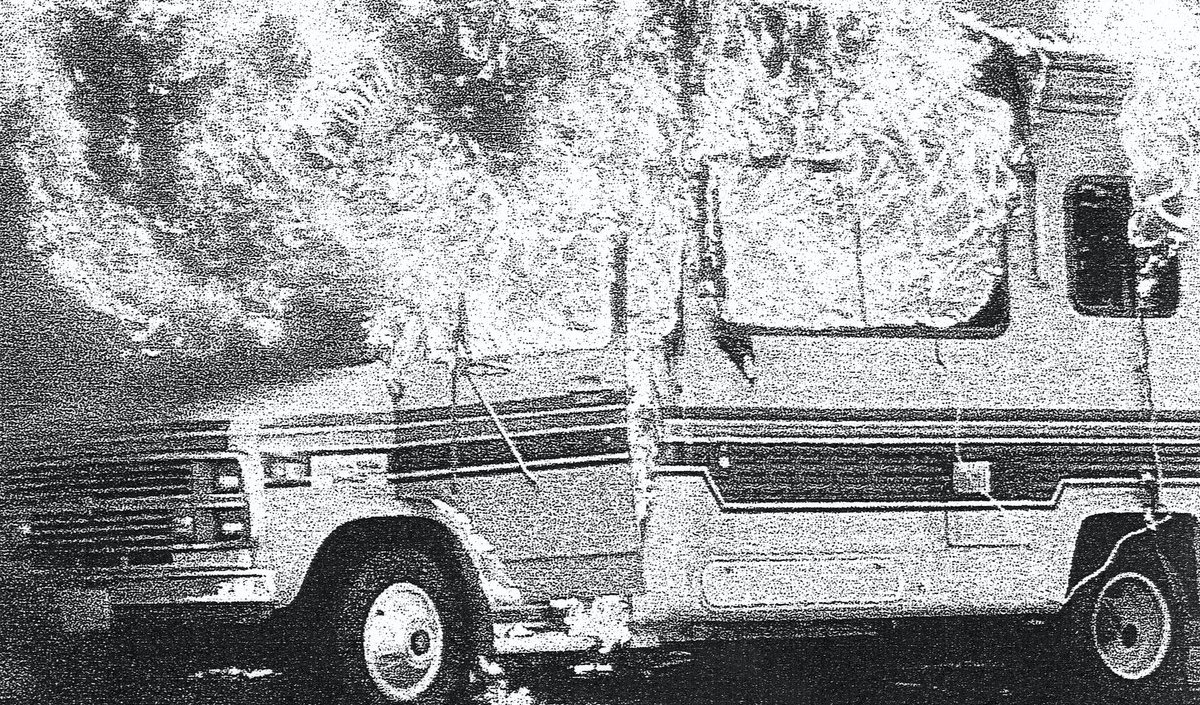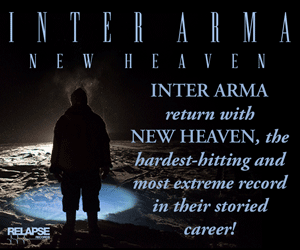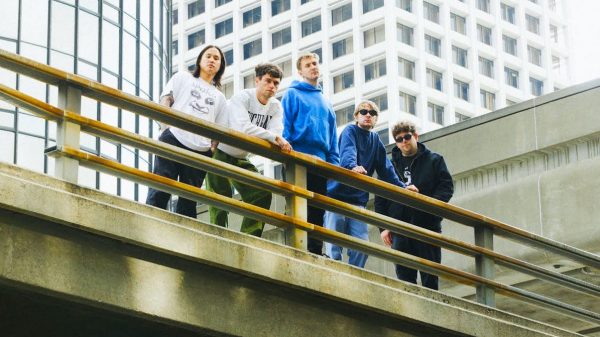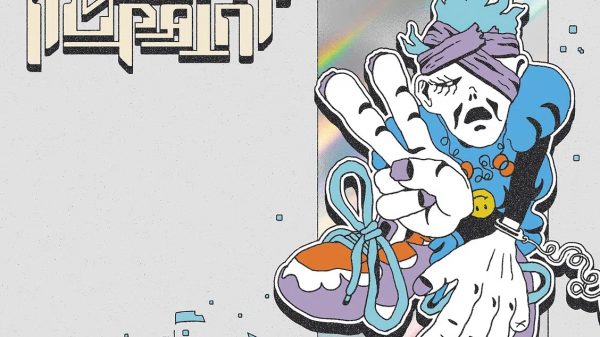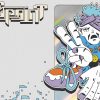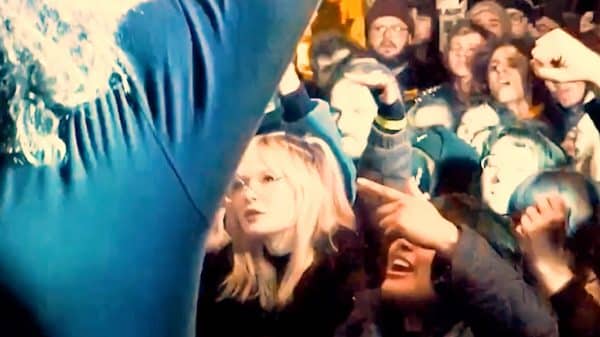When Militarie Gun released My Life Is Over (reviewed by Cvlt Nation here) in Sept. 2020, one had to wonder if this project, like so many other endeavors of quarantine-driven restlessness, was just a dabbling, a whimsical excursion into something new for an artist who had already ascended to the topmost echelon of the genre with which he was most associated.
Fortunately for everyone, Militarie Gun was no flash-in-the-pan for powerviolence prodigy Ian Shelton, best known until recently as the driving force behind hardcore juggernaut Regional Justice Center. Fans would excuse him if, following the creative space and time afforded by quarantine, he put this project on the shelf, a beautiful artifact there for us to treasure in perpetuity. Anyone who’s paid attention to Shelton’s career, though, knows that he doesn’t just tip his toes into anything. For a man with infinite creative energy but a finite schedule, he somehow manages to commit himself totally to all of his ventures.
Released just months after Regional Justice Center’s magnum opus, Crime and Punishment (which Cvlt Nation covered here and here), Militarie Gun released All Roads Lead To The Gun 1 and, shortly thereafter, All Roads Lead To The Gun 2, in June and September respectively. These releases also found the band finally able to share these songs in front of live audiences. Featuring guitarists Nick Cogan (of Drug Church) and William Acuña, drummer Vince Nguyen (of Modern Color), and bassist Max Epstein, Militarie Gun’s eagerly-awaited live debuts also featured Shelton at the front of the stage instead of behind the drum throne.
Combining the inside-out approach to melody and song structure of Guided By Voices and Pixies with the post-hardcore rawness of Lungfish and Unwound, the songs on these dual EPs deliver on and build upon the promise of My Life Is Over, cementing the fact that Militarie Gun is no side-project. Shelton, Cogan, Acuña, Nguyen, and Epstein have invested skill, passion, and ingenuity into this band, and All Roads Lead To The Gun 1 & 2 pay high dividends.
Ian Shelton found time in his impossibly full schedule to talk with Cvlt Nation about these amazing releases.
One of the things that made Militarie Gun different from other projects is that you would just be doing frontman duties in terms of how it would look live. Can you talk about how your experience of performing live in that role is different from when you are fulfilling other roles?
It feels really natural actually. I don’t really have the anxiety that I have with Regional Justice Center. I do to some extent because I have to actually think about singing notes correctly and stay on pitch, but I feel like when I stand up there, I’m like, this is all where it should be. It just feels natural to me for some reason. I did it in high school and stuff, but I haven’t fronted a band since I’ve been in my twenties. I like it. It cuts down the anxiety. Anxiety is a huge part of the pre-gaming because, with RJC, there’s so much that can go wrong, so unless my voice is failing, there’s not nearly enough anxiety to be a bother for me for Militarie Gun.
Do you find that your experience with the crowd is different?
The whole thing is built on two different audience practices, where RJC is something of a battle with the audience–it’s meant to be contentious and crowd reaction has never been ingrained with RJC and the music has never been thought of with regard to crowd reaction. It’s just been whatever we want to hear. Militarie Gun is the same way where the songs are what I want to hear, and the lyrics are what I want to say, but at the same time, it’s much more symbiotic between audience and band. And that’s how the first few shows have been. It was really interesting at the show we did a few days ago where, because of COVID stuff, I could see it boiling under people’s skin that they wanted to be like jumping around and singing along but there was a little bit of “Am I allowed to? Am I not allowed to?” and in my head, I’m trying to think through, “What happens when we play shows where it’s not our audience and people look at us like we’re crazy?” The relationship is just totally different between that and RJC because it’s meant to be fun. It’s meant to be energetic in a more communal way. That’s the hope with the music is that people are bouncing and doing different things instead of standing there with their arms crossed.
I suspect that a lot of the Militarie Gun fans are also RJC fans. I don’t know if it’s a trend but it’s at least a phenomenon where hardcore musicians and hardcore fans have found this warmth for more post-punk/alternative, with bands like Lemuria, Fiddlehead, Koyo, Drug Church, and Modern Color. It seems like the fanbase for those is also a major hardcore/powerviolence fanbase. What do you think it is about this style that appeals to an audience that is usually pretty discriminating about music that’s “not heavy or fast enough”?
We all grew up on something subversive and challenging, but as you get older, you want more melody. You still want the songs not to be boilerplate, generic pop music. You want something that’s still challenging and interesting. That’s why you have things like post-hardcore and post-punk. It’s in the title. It’s grown out of the tradition of being challenging, abrasive, and weird. With that, the imagery can be weird, the way people are can be weird, it all can be subversive in itself even if the music can be less challenging at times. There’s a push-pull between imagery, sound, and everything that plays off of punk. It’s just a natural extension to me. In the first wave of hardcore, with Minor Threat going on to embrace Fugazi. People will find that path no matter what, whether it be emo that grew out of hardcore or anything else like that.
Do you think that bands think that, at some point, pushing the hardcore elements, the aggressive elements further isn’t subversive within the genre anymore, and that they can be subversive by pulling back on that a little bit. Early in her career, I was thinking that the only thing that Lady Gaga could do at a certain point to be shocking would be to come out with a t-shirt and jeans or a gown. And that’s what she started doing. I wonder if that’s your experience. It’s hard to find anything more aggressive than RJC, so is this you subverting hardcore and powerviolence, or is it just scratching another itch?
When you’re young, you want something so hyper-aggressive, something that can kind of capture the immature and immediate rage; whereas, as you get older, you want catharsis, something that speaks to you in a different way. That’s where this more melodic or nuanced approach comes in. You’re not feeling that boiling rage all the time anymore; you’re feeling the flow of life.
I definitely agree that that is part of the listening experience. Do you think that it’s part of the writing experience as well?
I never consciously thought about it that way, but for sure. It’s more nuanced than the one-minute RJC song, which is about finding the least amount of words to speak the most gnarly point that I could. With Militarie Gun, it’s trying to express something more vulnerable, which just doesn’t work in as small of a space. You need more room to explain yourself.
I’d like to ask about your approach to songwriting for Militarie Gun, musically and lyrically, and how it’s different from other things you’ve done.
The big difference is that, with RJC, a lot of intention goes into the writing, whereas all of Militarie Gun since the inception of the band has somewhat been about a lack of intention and more about moment-to-moment reactions to life or to a feeling and more immediacy in the reaction to whatever’s happening in my life at that moment. It’s more or less like freestyle. When I’d go in to record the demos, I’d go from the first riff to a completed song with vocals within two hours, having had nothing written down before. When that’s the case, you get at something more subconscious, less pre-meditated, and so I sang about a lot of things that I didn’t even know I wanted to sing about. The downside of that writing style is that, because I went in without pre-meditation, I found out that I used a lot of the same words. Your instinct for wording is often the same. For instance, I say “can’t” a lot. “Can’t seem” is a phrase that I say around three times across the Militarie Gun songs.
For me, looking through the lyrics, especially because these two EPs are partners, it looks thematic to me. In poetry, we English teachers would call it a refrain or anaphora; in a novel, we’d call it a recurring motif. In particular, in “Don’t Pick Up The Phone,” you’ve got “I want money; I want love. In search of something, I’d rather not,” and that sounds like you’re conflicted over whether you should even be searching for something. Then, in “All Roads Lead to the Gun,” you end with, “I need to find something; I need to pull my brain.” That felt like beginning with this discomfort about this trait in your personality, this searching and not finding, and then embracing your need to search at the end.
Well, yeah. A big thing for me, specifically in the past year, has been desiring some level of peace, and I’m unable to find it. I would like to do less. I would like to relax. I would like not to be at an unsustainable pace, doing everything I’m doing, yet I still do it. When I wrote “ Don’t Pick Up The Phone” last August, I was in the exact same mindset I was in this August, where I was more or less suicidally overloaded, with too many tasks, too many things to do, no time to just be still. It’s a part of me that is always over-signing myself up for things, and it’s a constant source of internal conflict: just wishing that I could relax, but when I finally get a day to relax, I start signing myself for more things to do. That’s where that push-pull is. I would love to do nothing. I would love to go on a vacation and relax, but the second I do that, I start signing myself up for tasks to do in the future that eventually overload me. It’s a constant cycle. That’s very much what the song “All Roads Lead To The Gun” is about. “When it leads to the gun, gotta pull back and adjust.”
That was going to be my next question, about that line and the follow-up line: “When it ceases to be fun, run.” Where do you think that impulse comes from? We talked a little last time about whether your artistic drive to create is a form of therapy. Is that what you’re describing?
My theory on it is that I was somewhat an indoor kid when I was growing up. I was in a small town and I couldn’t really go anywhere. I couldn’t make it to the city. I couldn’t go to shows. All I could do was plan things for the future, so I think I got into this constant cycle of planning. I booked my first tour at 17, and I was just always looking to have something on the horizon. Now that I’m able to achieve things at a quicker pace, I’m still just constantly signing myself up for more things, thinking it can all be done or that the timelines all work out when they never do.
It’s kind of that constant grind. You have to dedicate yourself to this unsustainable level of work when you’re getting things started in order to get to a certain point, to get to a level of success that you recognize as your goal.
Entertainment, in general, is established on this concept that you kill yourself so hard that people reward you for it. Especially in film, if you’re not killing yourself hard enough, people don’t respect you. They think that you’re not taking it seriously. If you expect to live a normal life where you don’t have to work fourteen-hour days, you’re looked down upon, or if you don’t work more than a normal person should. I think that’s the way it is with all entertainment, including music. Touring is based on the idea that you play five or six days a week, you drive eight to twelve hours or more. You’re getting to hang out with your friends and do fun stuff, but you’re always on. It’s more or less a twenty-four-hour workday. It’s all based on living a life that most people wouldn’t choose to be involved in.
Is there ever a point where you’re satisfied with the point you’ve reached?
I have yet to find it. I sure thought that I would have felt that by now. The goal line continually stretches out. It’s a dangling carrot. But you switch out the carrot. It’s like, “I didn’t want a carrot. Actually, I wanted a banana.”
Is Militarie Gun the banana, then?
Yeah, RJC was the carrot. This is the banana. We’ll see what the next thing is.
When you were talking about being alone a lot as a child and having to use that time to think creatively and work on jobs. Is that part of what “Background Kids” is about?
“Background Kids” is moreso about just gaining a new understanding of addiction and kind of understanding the concept of “I’ve found a way to escape, and I would like to stay gone.” It’s about having empathy for why someone would want to stay away in an altered state instead of addressing their reality. It’s posing the thought: imagine something that’s worth failing your children. Imagine if running away from your past is worth failing your current reality.
Do you feel like it was necessary to get to a certain point with RJC before Militarie Gun was something that you felt comfortable exploring?
Yes and no because the fear of the audience that I had already established was something of an issue for me. I was thinking, “Are these people going to call me lame or something because I’m doing something softer or more vulnerable?” It was in my head as a deterrent, but it’s always been something that I’ve wanted to do. This very idea for a band has been in my head since I was fifteen years old. It just took me a long time to work up the courage. I more or less got to a place where I would rather put out something that scares me really bad than not.
Speaking of wanting to do this from early on, a lot of the early reviews—including mine—trace the musical influences of this back to early Dischord, Amphetamine Reptile, nineties grunge, post-hardcore, etc. Is that accurate? Could you talk about the musical influences on Militarie Gun generally and on these releases specifically?
Definitely, Dischord is a really big one, but I think one of the really understated influences, one that’s not as popular to talk about, is Modest Mouse.
I mentioned that one in my first MG review, and I thought “I hope that’s right because I can’t not hear it.”
I don’t know if a lot of people know this, but Isaac Brock lived at Dischord at a young age. He moved from DC back to Washington and started Modest Mouse. If you listen to it and look at the influences—basically Fugazi and Sonic Youth—you realize that is what the band sounds like. People don’t realize that it’s another band that is in the tradition of hardcore. I remember talking to Chase from Gatecreeper, and he asked if I thought Modest Mouse was an emo band. I said I didn’t think they were an emo band. They’re much closer to a Revolution Summer thing (though some people consider that emo too). It’s tough to say.
The combination of Modest Mouse, Born Against, Black Flag, and The Jesus Lizard: those would be the four guiding lights, and then I run it through a filter of whatever I’m listening to that day. It could be The Strokes, really aggressive hardcore, pop music, or “Song #2” by Blur. I run it through those filters and that’s how you get the product of what Militarie Gun is.
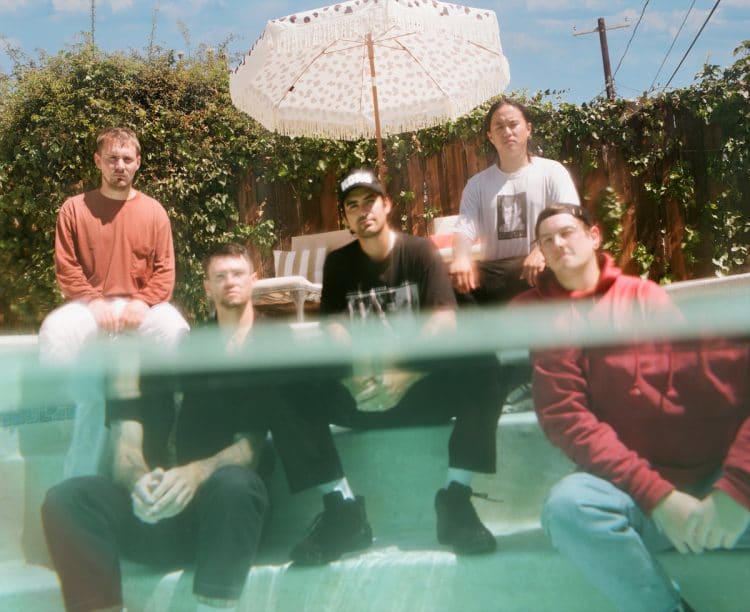
Can you talk about releasing two EPs rather than an LP?
It didn’t feel like the right time for an LP yet. I wanted more of a chance to grow the band between multiple releases versus putting all our eggs in one basket. It would have been too much to release an LP this year and then do one next year—which we already have enough songs for. I just thought, if we do two EPs in a year and an LP next year, that makes sense to an audience. People don’t like the LP a year model as much, though that’s the one I’d like to be on. We have to keep the output down to a sustainable rate that doesn’t burn out the people who enjoy it.
That’s that creative grind you were talking about.
Yeah. We have a lot of songs, so it’s a question of how we get them all out to people in a way that they’ll accept and enjoy. That’s the hard part because that’s the marketing part.
Although these are two EPs, they’re companion EPs. Can you talk about what connects them?
The guiding light of All Roads Lead to the Gun as a session is just this feeling of inevitability. “Big Disappointment” is about this inescapable, unavoidable, under-the-skin rage. Everything is a degree of “it’s bound to happen.” I only thought about this when it was all done. I didn’t really have a focus for it in the amassing of all the material, but I realized, looking back now at the body of work, that it is all very much about inevitable things and inescapability. You can’t escape a certain way of feeling. You can’t escape a certain habit. You’re just kind of on that path, no matter what.
Do you think the lyrics to these songs are more general? Where the RJC songs may be more specific to you and your life, are these songs more about universal experiences?
I would just say that RJC is laser-focused. I go in so conceptually driven. I’m focusing on the lyrics through the concept that I have in mind. For this, I didn’t do that at all, so maybe it does end up being broader because of that lack of intention. Maybe I’m speaking on things that affect everybody and I’m not trying to filter it out because it doesn’t fit a certain narrative.
That stream-of-consciousness or freestyling may lend itself well to talking about things that all people experience.
It goes into fewer specifics. RJC songs are very specific. To have something that doesn’t overdo the informational, contextual part of it, it’s just letting the words exist so the listener can put whatever they want into it.
What inspired you to start Alternatives? What is an Alternatives band?
Alternatives was started because my friend Waylon and I were looking at the way DIY labels operated, and they were just paying to put out vinyl. We thought, “That doesn’t really do anything besides save the band money.” We wanted to start a DIY label to help a band do things that they couldn’t do themselves. For instance, take a band like Ingrown. We stepped in early in that band’s life, and we promote them as much as possible, we provide as much opportunity as possible, and we try to get them toward the best possible ways to grow the band. We try to go above and beyond, to do more than just paying for vinyl. When we’re looking at bands, we need to ask, “Is this a band we can do something for, or do they already know how to do everything themselves?” Now that we’re coming off the streak of records that we are—we just did Supercrush, Self Defense Family, RJC, Militarie Gun, and now Ingrown—we have to figure out how we can use that momentum to find a band that needs help that can’t reach a label like Closed Casket or Run For Cover, and we have to figure out how we can get them to the next level.
It’s an interesting time for labels because, in a world where it’s fairly easy to book your own tours and release your own stuff on Bandcamp, what purpose are labels serving anymore, other than exposure?
That’s the question. When finding a label, it’s about “what do they have to give me?” Is it money, distribution? Obviously, I’m a fairly DIY person myself, so I can do a lot of what a label can do, so they need to have resources that I don’t have access to for it to be worth giving them the rights to our songs.
You mentioned Chase from Gatecreeper a bit ago. He was involved with the art for the EPs?
Yeah, he Xeroxed the record covers for me.
Who took the photographs?
I did. Both the record covers are my photos.
Can you talk about the imagery between those two covers and how it’s part of Militarie Gun’s aesthetic? The first EP had a pretty minimalist cover, but these are really striking. What about them says Militarie Gun?
I was trying to commission a painting for a really long time, and it just wasn’t possible for the budget and the type of artist we were looking to work with. I was in a super frustrated state, thinking “I don’t know what the hell I’m going to do for art for these records.” I was in South Central delivering weed because that was my job at the time, and I saw this fire happening. I just came up and started taking photos. It was just the craziest fire I’d ever seen. I stayed there as the firemen put it out, and I just kept documenting it. Using the word “road” and being in flames, it feels very relevant to the music. It feels to me like All Roads Lead To The Gun 1 is this self-immolation, and the aftermath is All Roads Lead To The Gun 2. That’s why it culminates in the track “All Roads Lead To The Gun.” It feels like everything has come to an end. I wanted to do something that told a story in two parts.
That’s why it’s interesting that you say you don’t put as much thought into the Militarie Gun lyrics. Just like Crime & Punishment, you’ve got a question and an answer in these two EPs, so I was curious about how intentional that was.
It was coincidental, honestly. You make a big mess, and you try to make sense of it later. If you overdo it on the intention, you could risk making something really terrible if it doesn’t feel relevant and interesting in the moment.
I think that’s a filmmaking approach, right? That the real writing is in the editing?
That’s not what a writer would say, but that’s what the process ends up being. I was in production on a music video yesterday, and there’s the mess-making portion and the mess-cleaning portion. They’re just different pieces of the puzzle. It’s one continuation of the other.
In addition to touring, are there any plans who feel like announcing?
We’re just going to be touring. We’re trying to spread the word as much as we possibly can. We’ve been working really hard on the LP, and we’ve got an LP’s worth, but we’re still writing. And hopefully, we’ll be releasing some collaboration records soon.
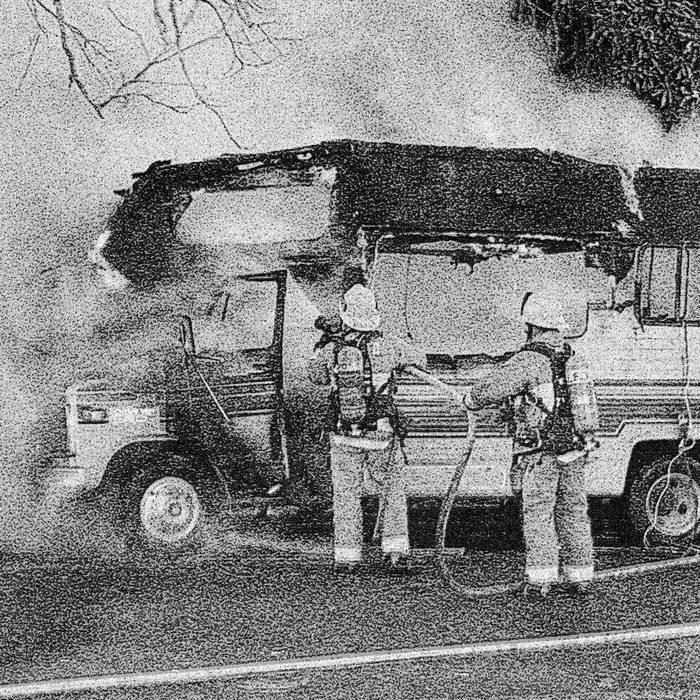
Both EPs were engineered and mixed by Taylor Young at West Alley Recordings and The Pit Recording Studio.
They were mastered by Nick Townsend at Townsend Mastering.
Buy the digital EPs at the band’s Bandcamp, and buy Militarie Gun merch at Shelton’s Alternatives Label.

